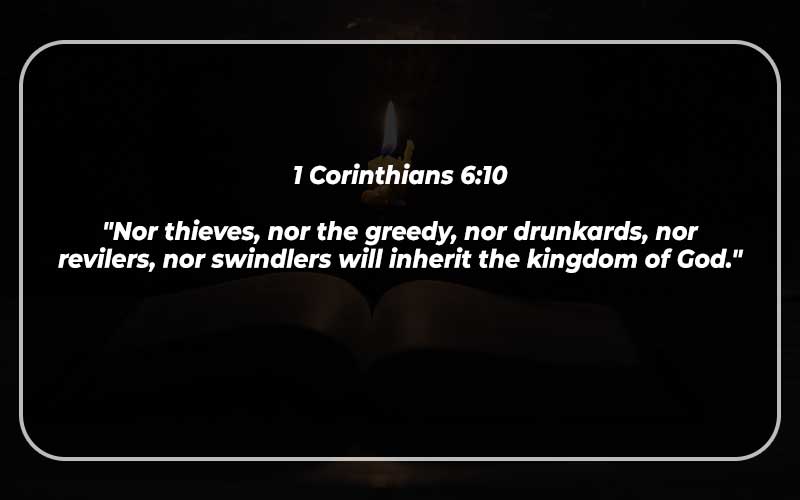The Bible addresses the issue of stealing, providing guidance on ethical conduct, integrity, and respect for others’ possessions. This compilation explores 30 Bible verses about stealing, accompanied by commentaries to elucidate the scriptural teachings on honesty, stewardship, and the consequences of theft.
These verses emphasize the importance of living with integrity and honoring God’s commandments in all aspects of life.
Bible Verses About Stealing
Exodus 20:15
“You shall not steal.”
The commandment given to Moses at Mount Sinai straightforwardly forbids stealing, setting a foundational principle for ethical behavior.
Commentary: This concise commandment encapsulates the biblical stance on theft. Stealing not only violates the rights of others but also undermines trust and the sense of community.
Leviticus 19:11
“You shall not steal; you shall not deal falsely; you shall not lie to one another.”
In this verse, stealing is coupled with falsehood and lying, emphasizing the interconnectedness of dishonest behaviors.
Commentary: God expects His people to uphold truthfulness and integrity. Stealing involves not just the physical act but also deceit, revealing the broader spectrum of dishonesty.
Proverbs 6:30-31
“People do not despise a thief if he steals to satisfy his appetite when he is hungry, but if he is caught, he will pay sevenfold; he will give all the goods of his house.”
This Proverb considers the motives behind stealing and the consequences one must face if caught.
Commentary: While addressing the desperation that may lead to theft, the verse does not justify the act. Instead, it underscores the severity of the consequences, encouraging righteous living.
Ephesians 4:28
“Let the thief no longer steal, but rather let him labor, doing honest work with his own hands, so that he may have something to share with anyone in need.”
The apostle Paul calls for a transformation in behavior, promoting honest labor and generosity as an alternative to stealing.
Commentary: The emphasis here is on a positive transformation – moving from taking to contributing, aligning with the Christian principles of selflessness and compassion.
Proverbs 11:1
“A false balance is an abomination to the Lord, but a just weight is his delight.”
While not directly about stealing, this verse condemns deceitful practices in business dealings, which are often intertwined with theft.
Commentary: God detests dishonesty in all forms. Using false weights or measures to gain unjust profits is seen as a violation of ethical standards.
Proverbs 20:17
“Bread gained by deceit is sweet to a man, but afterward his mouth will be full of gravel.”
This proverb highlights the temporary pleasure gained through deceitful means and the eventual bitter consequences.
Commentary: Ill-gotten gains may bring temporary satisfaction, but the lasting repercussions are likened to the discomfort of having a mouth full of gravel.
Zechariah 5:3-4
“Then he said to me, ‘This is the curse that goes out over the face of the whole land. For everyone who steals shall be cleaned out according to what is on one side, and everyone who swears falsely shall be cleaned out according to what is on the other side.'”
Zechariah’s vision depicts a curse associated with stealing and false oaths.
Commentary: The imagery emphasizes the sweeping consequences of dishonesty, suggesting that theft affects not only the individual but also the broader community.
1 Corinthians 6:10
“Nor thieves, nor the greedy, nor drunkards, nor revilers, nor swindlers will inherit the kingdom of God.”
Paul lists thieves among those who will not inherit the kingdom of God, emphasizing the severity of unrepentant dishonesty.
Commentary: This stern warning underscores the incompatibility of theft with the values of God’s kingdom, urging believers to turn away from such practices.
Matthew 6:19-20
“Do not lay up for yourselves treasures on earth, where moth and rust destroy and where thieves break in and steal, but lay up for yourselves treasures in heaven, where neither moth nor rust destroys and where thieves do not break in and steal.”
Jesus advises against placing undue value on earthly possessions, which are vulnerable to theft and decay.
Commentary: The focus here is on prioritizing eternal treasures over material wealth, highlighting the transient nature of earthly possessions.
Luke 19:8-9
“And Zacchaeus stood and said to the Lord, ‘Behold, Lord, the half of my goods I give to the poor. And if I have defrauded anyone of anything, I restore it fourfold.’ And Jesus said to him, ‘Today salvation has come to this house, since he also is a son of Abraham.'”
Zacchaeus’s repentance involves not only giving to the poor but also making amends for any dishonest gains.
Commentary: Zacchaeus’s response exemplifies the transformative power of encountering Christ, leading to a commitment to restitution and righteousness.
Jeremiah 17:11
“Like the partridge that gathers a brood that she did not hatch, so is he who gets riches but not by justice; in the midst of his days they will leave him, and at his end, he will be a fool.”
Jeremiah uses a metaphor to depict the folly of acquiring wealth unjustly, emphasizing the fleeting nature of ill-gotten gains.
Commentary: The analogy illustrates the emptiness and transience of wealth acquired through dishonest means, warning of the ultimate consequences.
1 Timothy 6:10
“For the love of money is a root of all kinds of evils. It is through this craving that some have wandered away from the faith and pierced themselves with many pangs.”
While not directly about stealing, this verse highlights the dangers of an unhealthy attachment to wealth, which can lead to various moral pitfalls.
Commentary: The caution is against an excessive desire for money, recognizing its potential to lead individuals astray and cause significant harm.
James 5:4
“Behold, the wages of the laborers who mowed your fields, which you kept back by fraud, are crying out against you, and the cries of the harvesters have reached the ears of the Lord of hosts.”
James condemns the unjust treatment of laborers, highlighting that their cries for justice are heard by the Lord.
Commentary: This verse addresses economic injustice, warning that fraudulent practices in denying fair wages do not escape divine notice.
Ezekiel 33:15
“If the wicked restores the pledge, gives back what he has taken by robbery, and walks in the statutes of life, not doing injustice, he shall surely live; he shall not die.”
Ezekiel emphasizes the possibility of repentance and restoration for the one who turns away from theft and injustice.
Commentary: God’s mercy is extended to those who genuinely repent and seek restitution for their past wrongs.
1 Corinthians 5:11
“But now I am writing to you not to associate with anyone who bears the name of brother if he is guilty of sexual immorality or greed, or is an idolater, reviler, drunkard, or swindler—not even to eat with such a one.”
Paul includes swindlers among those with whom believers should not associate, underscoring the seriousness of engaging in dishonest practices.
Commentary: The call to avoid association with those who persist in dishonesty reinforces the Christian commitment to moral integrity.
Proverbs 28:24
“Whoever robs his father or his mother and says, ‘That is no transgression,’ is a companion to a man who destroys.”
This Proverb condemns not only theft but also the callous disregard for family ties, emphasizing the severity of the transgression.
Commentary: The verse underscores the moral decay reflected in one who steals from their own parents, highlighting the destructive nature of such actions.
Psalm 62:10
“Put no trust in extortion; set no vain hopes on robbery; if riches increase, set not your heart on them.”
The psalmist warns against placing trust in ill-gotten gains, urging believers to guard against the allure of wealth acquired through dishonest means.
Commentary: The verse encourages a perspective that prioritizes trust in God rather than relying on dishonest gains for security and happiness.
Isaiah 61:8
“For I the Lord love justice; I hate robbery and wrong; I will faithfully give them their recompense, and I will make an everlasting covenant with them.”
God’s love for justice and His aversion to robbery and wrongdoing are declared, promising recompense and an everlasting covenant.
Commentary: This verse reaffirms God’s commitment to justice and His promise to bring about rightful consequences for acts of robbery and injustice.

Amos 3:10
“They do not know how to do right, declares the Lord, those who store up violence and robbery in their strongholds.”
The Lord’s declaration highlights the ignorance of those who hoard ill-gotten gains, emphasizing the futility of building upon a foundation of violence and theft.
Commentary: Storing up violence and robbery symbolizes a misguided foundation, one that ultimately leads to ruin and divine disapproval.
Jeremiah 7:9-11
“Will you steal, murder, commit adultery, swear falsely, make offerings to Baal, and go after other gods that you have not known, and then come and stand before me in this house, which is called by my name, and say, ‘We are delivered!’—only to go on doing all these abominations?”
Jeremiah rebukes those who engage in theft and various sins while hypocritically seeking refuge in the house of the Lord.
Commentary: The prophet exposes the inconsistency of claiming deliverance while persisting in sinful practices, highlighting the need for genuine repentance.
Hosea 4:2
“There is swearing, lying, murder, stealing, and committing adultery; they break all bounds, and bloodshed follows bloodshed.”
Hosea describes a society plagued by various sins, including stealing, resulting in widespread moral decay and violence.
Commentary: Stealing is depicted as one of the contributing factors to societal breakdown, emphasizing its role in the overall degradation of moral values.
Matthew 15:19
“For out of the heart come evil thoughts, murder, adultery, sexual immorality, theft, false witness, slander.”
Jesus identifies theft as originating from the heart, linking it with other immoral actions that spring from internal corruption.
Commentary: This teaching underscores the importance of addressing the root cause—the condition of the heart—when addressing issues like theft.
Romans 2:21-22
“You then who teach others, do you not teach yourself? While you preach against stealing, do you steal? You who say that one must not commit adultery, do you commit adultery? You who abhor idols, do you rob temples?”
Paul challenges those who profess moral principles but fail to live by them, exposing the hypocrisy in condemning theft while engaging in similar acts.
Commentary: The passage highlights the inconsistency between teaching against stealing and practicing theft, emphasizing the need for genuine adherence to ethical standards.
Zechariah 5:4
“I will send it out, declares the Lord of hosts, and it shall enter the house of the thief, and the house of him who swears falsely by my name. And it shall remain in his house and consume it, both timber and stones.”
Zechariah’s vision depicts a curse entering the house of the thief, consuming both its structure and contents.
Commentary: The vivid imagery underscores the destructive consequences awaiting those who persist in theft and false oaths.
Malachi 3:8-10
“Will man rob God? Yet you are robbing me. But you say, ‘How have we robbed you?’ In your tithes and contributions. You are cursed with a curse, for you are robbing me, the whole nation of you. Bring the full tithe into the storehouse, that there may be food in my house.”
Malachi addresses the act of robbing God through neglecting tithes and offerings, emphasizing the spiritual implications of dishonesty in giving.
Commentary: The passage challenges the notion of robbing God by withholding what rightfully belongs to Him, calling for obedience in financial stewardship.
Ezekiel 18:10-13
“If he fathers a son who is violent, a shedder of blood, who does any of these things (though he himself did none of these things), who even eats upon the mountains, defiles his neighbor’s wife, oppresses the poor and needy, commits robbery, does not restore the pledge, lifts up his eyes to the idols, commits abomination, lends at interest, and takes profit; shall he then live? He shall not live. He has done all these abominations; he shall surely die; his blood shall be upon himself.”
Ezekiel’s description includes the sin of robbery as part of a list of abominable acts, emphasizing the severe consequences.
Commentary: The passage connects robbery with other grave sins, emphasizing the collective weight of wrongdoing and its impact on an individual’s fate.
Proverbs 10:2
“Treasures gained by wickedness do not profit, but righteousness delivers from death.”
This proverb contrasts ill-gotten treasures with the deliverance that comes from living a righteous life.
Commentary: The verse underscores the futility of acquiring wealth through wicked means, highlighting the redemptive power of righteousness.
Micah 2:1-2
“Woe to those who devise wickedness and work evil on their beds! When the morning dawns, they perform it, because it is in the power of their hand. They covet fields and seize them, and houses, and take them away; they oppress a man and his house, a man and his inheritance.”
Micah condemns those who plan and execute evil deeds, including theft and oppression of others.
Commentary: The prophet denounces the covetousness and cruelty inherent in stealing, emphasizing the harm inflicted on both individuals and their inheritance.
Proverbs 22:22-23
“Do not rob the poor, because he is poor, or crush the afflicted at the gate, for the Lord will plead their cause and rob of life those who rob them.”
This Proverb admonishes against exploiting the poor and affirms God’s commitment to advocating for the cause of the oppressed.
Commentary: The warning against robbing the poor aligns with the broader biblical theme of God’s concern for justice and protection of the vulnerable.
Matthew 19:18
“He said to him, ‘Which ones?’ And Jesus said, ‘You shall not murder, You shall not commit adultery, You shall not steal, You shall not bear false witness.'”
In response to a question about eternal life, Jesus reaffirms the prohibition against stealing as part of the moral commandments.
Commentary: Jesus upholds the enduring relevance of the commandment against stealing, emphasizing its significance in the ethical framework for righteous living.






Bible Commentary, Blog
50 Important bible verses of thanksgiving (With Explanation)